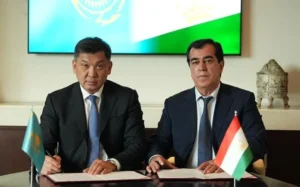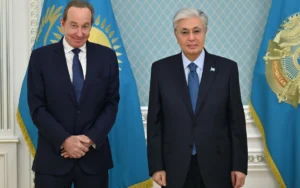EU Ambassador Showcases 2024 Successes in Climate Action, Energy Security, Migration, and Kazakhstan Cooperation

Astana, The Gulf Observer: Aleska Simkic, Ambassador of the European Union to Kazakhstan, shared insights into the EU’s notable achievements in tackling pressing global issues, including climate change, energy security, migration, and foreign policy. Speaking to media outlets, Ambassador Simkic emphasized 2024 as a pivotal year in addressing these challenges and strengthening international cooperation.
Addressing Climate Change and Energy Security
Ambassador Simkic highlighted the visible impacts of climate change, such as the April floods in Kazakhstan, which underscored the urgency for enhanced prevention, adaptation, and mitigation measures. She praised the EU’s decisive role in securing a breakthrough climate finance deal at COP-29 in Baku, raising climate financing for developing countries to $1.3 trillion annually by 2035, with a review mechanism for potential increases by 2030.
The EU’s commitment to sustainable energy practices also took center stage. Simkic noted the adoption of the Critical Raw Materials (CRM) Act and the establishment of strategic partnerships with countries like Kazakhstan, Uzbekistan, and Greenland. Kazakhstan was the first Central Asian country to sign an MoU on CRMs with the EU in 2022, marking it as a key partner in renewable energy initiatives.
Migration and Asylum Reforms
Migration, a persistent global challenge, remains a focus for the EU. Ambassador Simkic pointed to the progress made under the new Pact on Migration and Asylum, which establishes unified rules for managing migration and asylum systems. The interconnectedness of migration with climate change and geopolitical conflicts was also emphasized.
Promoting Economic and Political Cooperation
Ambassador Simkic lauded the EU-Mercosur trade deal, finalized at the end of 2024, which prepares the creation of the world’s largest free trade zone, uniting the EU with Mercosur countries (Argentina, Uruguay, Paraguay, and Brazil) and impacting over 700 million people.
In foreign policy, Simkic reaffirmed the EU’s unwavering support for the UN Charter and its provisions, while noting strengthened partnerships with nations sharing similar values, including Kazakhstan.
Technological and Legal Advancements
Ambassador Simkic highlighted two landmark EU legislations: the Digital Services Act (DSA) and the Artificial Intelligence Act (AI Act). The DSA, fully implemented in 2024, ensures online safety, protects fundamental rights, and regulates international platforms operating in the EU. The AI Act, the first comprehensive global legislation on artificial intelligence, establishes the EU as a leader in AI governance.
Strengthening Connectivity and Regional Cooperation
Ambassador Simkic spotlighted the progress of the Trans-Caspian Transport Corridor, a vital initiative under the EU’s Global Gateway strategy. Beyond infrastructure, the project aims to enhance mobility and connectivity between Central Asia and Europe.
She also acknowledged Kazakhstan’s anti-corruption efforts, which have gained support from the Council of Europe, as a significant step toward transparency and good governance.
European Green Deal and Future Prospects
Reflecting on the EU’s progress toward a climate-neutral future, Ambassador Simkic underscored the importance of regional partnerships, such as the EU’s green hydrogen collaboration with Kazakhstan and initiatives under the Team Europe framework.
Ambassador Simkic concluded by emphasizing the EU’s proactive approach to addressing global challenges, ensuring sustainable development, and fostering international cooperation across diverse fields.


